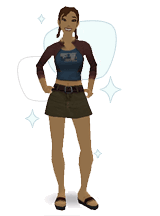|
|
 The Guardian
I'll meet you There
By Sean Dodson: February 27, 2003
Its creators describe it as "the first online getaway" - a place where the sky is always blue and the sun never sets. Analysts are calling it the next generation of chatroom, others call it a game that never stops. It is a virtual space that exists solely on the internet. It is a place called There.
There Inc is a $33m start-up based in California. It has spent three years building a virtual world inspired by Neal Stephenson's vision of the metaverse in his classic science fiction novel Snow Crash. There features Disney-like avatars floating around a beautifully rendered three-dimensional environment that feels like a never-ending day on a tropical island. It is only one of a growing number of virtual worlds that are already inhabited by hundreds of thousands connected over the internet. And far from the image of isolated individuals tapping away at their computers, the inhabitants of these new worlds are proving just as socially minded as the rest of us.
It is Friday evening, 6pm Pacific standard time. Inside the game in a clearing among some palm trees and beach huts, more than 100 people are gathering for the first antiwar rally to be held in a virtual world. A hundred people might not sound like much, until you consider that There isn't even commercially available yet. The 100 or so who attended Polygons for Peace are "beta testers", volunteers who offer to try out the world for free.
Among them is Nigel Jett, a 23-year-old student from Washington State. Jett stumbled across Polygons for Peace only minutes after first entering There in January.
"Two guys and a girl wearing a T-shirt with a peace symbol on it were sitting beneath a virtual gazebo," he says. They invited him to join, and since then, he has helped arrange the peace rally. Today he starts and polices antiwar discussions.
You could argue that these people would be better off organising a protest in the real world. But Jett says that is missing the point. "We had some really great discussions, we had lots of really diverse opinions," explains Jett. "It was very decentralised. No one was making speeches. Some people tried to coordinate things and made sure that discussions were actually productive and didn't turn into name calling."
Just as in the real world, a few troublemakers showed up and tried to disrupt the three-hour meeting. Representatives of the company and pro-war campaigners came to have a look, too.
Unlike its rival The Sims Online, There has been likened more to a sophisticated chatroom than a game. Characters speak in speech bubbles as in a comic strip. The game's designers have developed a detailed set of gestures and facial expressions that allow avatars to wink, flirt, laugh and even blush. Broadband users can even talk to each other.
Inside There, you can travel about the islands on dune buggies and float on hover boards. You can buy virtual clothes and rent property. Unlike earlier virtual worlds, the game encourages players to trade virtual items for real money. You can design and sell your own clothes or buy a virtual pair of Levi jeans or Nike trainers.
Last Friday's peace rally was not an isolated event. There is a history of protest within virtual worlds. In 1999, in a protest over software glitches inside Ultima Online, a group of players lost their rag with the company and staged a coup. They stormed the castle of Lord British, Ultima's monarch and the alter-ego of its founder, Richard Garriot, and murdered his character.
But there are signs that citizens of virtual worlds are becoming more political.
In September, Electronic Arts, makers of The Sims Online, announced a multi-million dollar product placement deal with fast food giant McDonald's. Players in the game are able to buy and run their own McDonald's kiosk. Eating a Big Mac inside the game improves the players' standing. But some gamers were incensed.
"Product placement weakens the overall aesthetic of a game in ways more insidious than movie or television-based placement," wrote Tony Walsh in Shift.com.
"Our gaming experience is cheapened, but game titles are no less expensive. Publishers have already set the price of a computer game two to three times that of a new DVD movie. Will games with integrated advertising be any less expensive than games without? Not bloody likely."
What is more likely is that virtual worlds will go increasingly mainstream this year. EA has sold 19m copies of The Sims, making it the best-selling game of all time. The new online version - which will be available in the UK later this year - has sold less well, with only 100,000 people subscribing so far.
Nearly 500,000 people pay Sony $13 a month to play EverQuest, an online version of Dungeons & Dragons. The largest virtual world is Lineage, with more than 4m subscribers in South Korea.
As veteran programmer Mark Pesce noted in a catalogue of last year's Barbican's Game On exhibition, "it's a Walter Mitty-like state on a national scale".
|
 |
©2010 Makena Technologies, Inc. All rights reserved.







